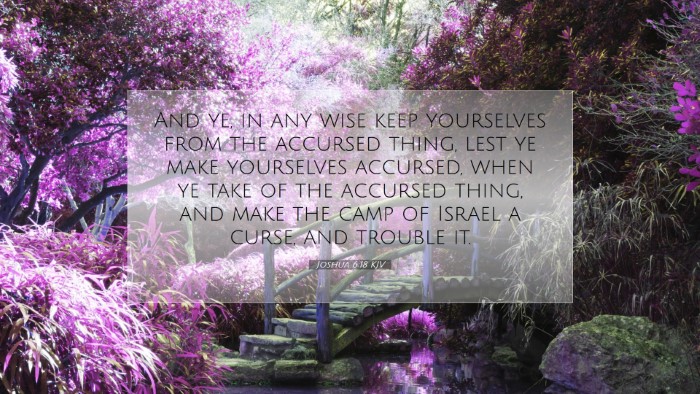Bible Commentary on Joshua 6:18
Introduction
Joshua 6:18 states: "And you, by all means, abstain from the accursed things, lest you become accursed when you take of the accursed things, and make the camp of Israel a curse, and trouble it." This verse is a critical moment in the narrative of the conquest of Jericho, emphasizing the need for holiness and obedience to God's commands during a significant period of Israel's history. The various commentaries provide valuable insights into the theological and moral implications of this verse.
Contextual Framework
This verse occurs in the context of God's specific commands to the Israelites as they prepare to take Jericho. The city represents the first of many battles as they enter the Promised Land, and the emphasis on the "accursed things" serves as a warning against disobedience. Commentators highlight the significance of this command within the broader narrative of Israel's journey into Canaan.
Insights from Matthew Henry
Matthew Henry, in his classic commentary, stresses the severity of the warning against taking "accursed things." He notes that the "accursed things" likely refer to items devoted to destruction or set apart for God's judgment. Henry points out that the prosperity and future success of Israel depended on their obedience to God’s command. He emphasizes that there is a profound connection between personal holiness and communal well-being, suggesting that individual disobedience could bring calamity to the entire congregation of Israel.
Consequences of Disobedience
Henry elaborates on the consequences of disobedience, noting that it "would not only be a sin in itself, but might also infect, corrupt, and bring a curse upon the whole camp." Through this, he stresses how communal responsibilities are tied to individual actions, an idea explored throughout the Old Testament.
Insights from Albert Barnes
Albert Barnes offers his perspective on Joshua 6:18, indicating that the command serves to prevent Israel from being tainted by the idolatrous practices associated with Canaanite culture. He interprets the "accursed things" as those items which could lead the Israelites away from pure worship of God.
The Importance of Divine Instruction
Barnes underscores the importance of following divine instruction meticulously. He asserts that adherence to God's commands is critical not only for victory in battle but also for the establishment of a holy community that reflects God's character and purposes. Barnes also emphasizes the spirit of the command, which points to the importance of inner purity and attention to divine distinctions in determining right from wrong.
Insights from Adam Clarke
Adam Clarke provides a detailed exposition on the nature of the "accursed things," interpreting them as items which had been devoted to God as a sacrifice or given to destruction, illustrating God's holiness. He notes that God's warning is profound, as it reflects His justice and holiness in dealing with sin.
The Nature of God's Wrath
Clarke discusses the response of God’s wrath against sin, suggesting that even minor infractions can lead to severe repercussions in their relationship with Him. He emphasizes God's demand for complete devotion and removal of all that is contrary to His will. Clarke also connects this to New Testament principles, where believers are called to separate themselves from sin and worldly influences, echoing the call for purity and holiness in the lives of the faithful.
Theological Implications
The implications of Joshua 6:18 extend far beyond the historical context of Israel's conquest. The commentators agree on the vital lessons concerning obedience, holiness, and the seriousness of sin. God’s mandate to abstain from accursed things invites deeper reflection on the nature of sin and its societal ramifications.
The Call to Faithfulness
Both Henry and Barnes articulate that believers today are equally called to a life of faithfulness and separation from that which is spiritually detrimental. The broader context of Israel's history, steeped in struggles with idolatry and disobedience, serves as a cautionary tale for contemporary followers of Christ. This highlights the enduring relevance of this command in urging believers to pursue righteousness and to guard their hearts from influences that might compromise their covenant relationship with God.
Application for Today
In practical terms, Joshua 6:18 serves as a crucial reminder for Christian communities and individual believers regarding the necessity of holiness in their spiritual walks. The concepts explored by Matthew Henry, Albert Barnes, and Adam Clarke inspire reflection on how modern believers might similarly 'abstain from accursed things' in their own lives.
Corporate and Personal Responsibility
The teachings derived from this verse invoke both corporate and personal responsibility. Churches and leaders must ensure they lead in a manner consistent with God’s Word, reflecting a commitment to holiness and obedience. Alongside this, individual believers must engage in self-examination to identify and renounce influences or practices that may lead them away from faithfulness to God.
Conclusion
Joshua 6:18 encapsulates fundamental truths about God's expectations for His people. The warnings against the "accursed things" resonate deeply with the call for holiness, reminding pastors, students, theologians, and scholars alike of the necessity to uphold spiritual integrity. The insights from esteemed commentaries not only enrich our understanding but also serve as a guide for faithful living in a world filled with competing influences.


